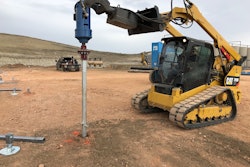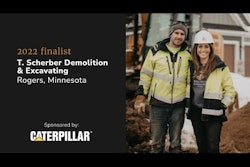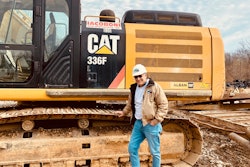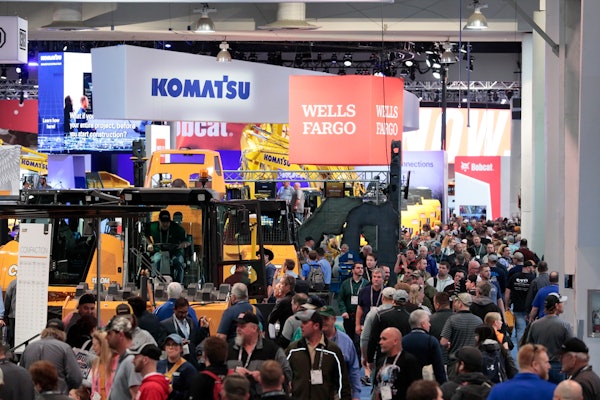When Eric Watson returned home from college in 2009 with a civil engineering degree, it opened new doors for Watson Excavating.
The business, founded nearly 40 years earlier by his grandfather, Foster Watson, had earned a reputation for meticulous work on residential construction jobs in the Turbotville, Pennsylvania, area. Now, the company was ready to enter the commercial space.
But before Eric and his father Lynn dove headfirst into a new niche, they went all-in on technology.
The $3 million to $5 million business and the technology it deploys have evolved a lot since 2009. What hasn’t changed is Lynn and Eric’s commitment to quality work and care for people.
To find out more about Watson Excavating, one of Equipment World’s 12 finalists for 2022 Contractor of the Year, check out the video above.
The awards program recognizes contractors who display the highest standards of business acumen, equipment management expertise, attention to safety and community involvement. Each year, 12 finalists receive an expense-paid trip to Las Vegas to participate in roundtable discussions and an awards ceremony.
The 2023 program will coincide with ConExpo-Con/Agg, North America’s largest construction trade show.
Equipment World serves up weekly videos on the latest in construction equipment, work trucks and pickup trucks – everything contractors need to get their work done. Subscribe and visit us at equipmentworld.com!
Lynn Watson (00:05):
I started with helping out my father who started the business in 1972, doing just part-time excavating work. At the time, he had two other jobs. He got to the point where he got more involved with the business and decided to quit the other jobs and to go into business for himself. I took the business over and my father helped me for a while and then he wanted to take time off, and being out there on the job yourself thinking, "How am I going to get this done?" Back then we didn't have level lasers. We had an old transit and stick and propping the stick up against the piece of equipment and running and looking through the old transit and then running back. That's how much we have progressed over the years. The technology has really changed.
Eric Watson (01:00):
I went to school for civil engineering, so that's definitely helped me in being able to understand the plan side of things for all the commercial projects. So just the overall knowledge that I've had over the years of being in the field doing the work prior to that, doing all the residential work, has helped me gain the knowledge on both sides of things. And when I came back and started working in 2009, we started to switch more and do a little bit more of the commercial work. It's a new avenue that we hadn't went into before, and since I've been here, we've grown and switched where the majority of our work now is in the commercial side of things, from both service site development, start to finish, everything from the storm water to getting the stone prepped and doing the paving at the end.
(01:52):
But with our background in the residential side of things, we do a lot of fine grading, a lot of projects where you're not relying just on the GPS, so you got to be able to do a lot of work that is more tedious work. So I think with that background in that tedious residential work, it allows us to be able to create a much nicer product, even on a commercial side of things, because the employees are so used to what's required. And switching from not having any sort of lasers, when you started to integrating to using just the rotary laser to then implementing maybe... We had put the grade control eyes on the sides of our booms of our excavators and then progressing the same way with dozers, to having your eye to switching to the full automatics on our machines, on our dozers and excavator, has definitely been a game changer for us.
Lynn Watson (02:51):
Our strength, I believe, is we're very particular in the job that we do for people. All of our jobs, we do very little advertising. Most of it is word of mouth, and that has kept us in business over all the years, 40 years, even during the slow times. So I think being there for people when they need us and never turning a job down, doing anything that we could possibly do, we did, and doing the job the right way. As I used to tell my operators, you are almost like an artist when you're grading. You start out with something very rough, and you get to see the project completed to where it's fine graded, the portrait's finished. That's what I like to see.
(03:42):
We treat our employees as almost like a family. I'm out on the job site. Many times it's one on one with them. Many times I'm down in the ditch, I'm carrying pipe, I'm with the laborers, and I think that means a lot to them. It's like, "He's just not standing there watching us. He's one of us."
Eric Watson (04:03):
We have a fairly young staff, so I feel like we all are at this stage of the young families. So I think our work hours, we try to keep those. We do work some longer hours in the summer, but we try to keep our work hours Monday through Friday, try to keep the weekend work to minimal, try to reward them. And we do have company holiday parties and stuff that's the whole family's involved. It's not just the employee and a spouse or something. We want to make sure that they keep their families involved the whole time.











